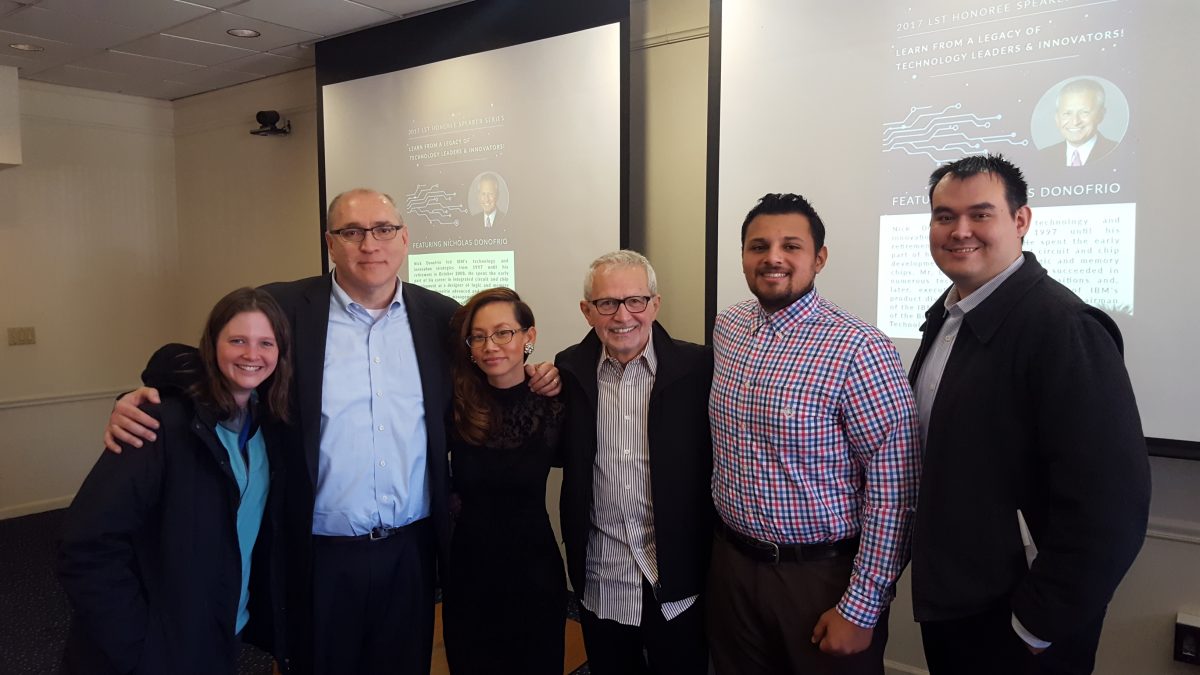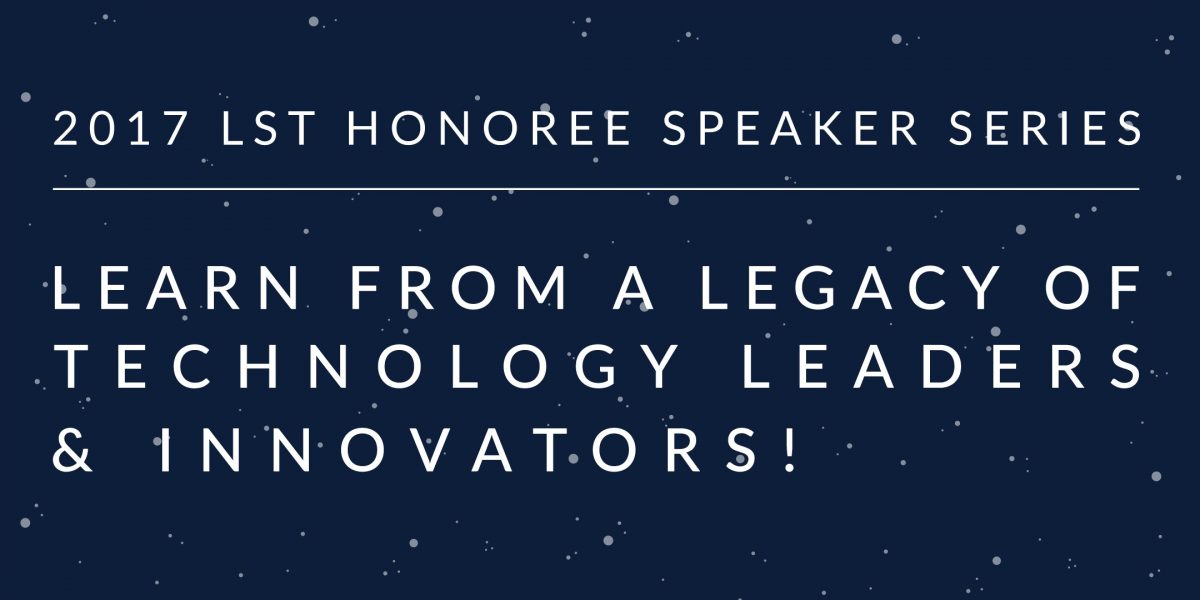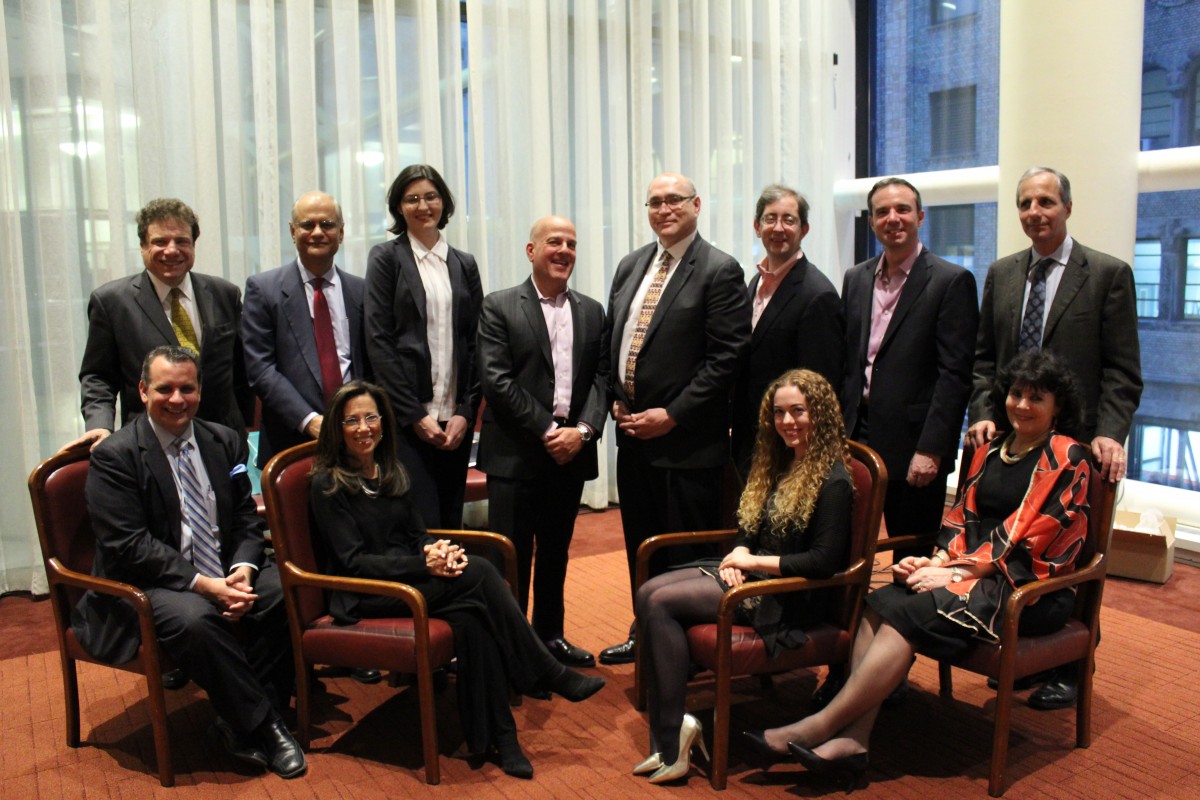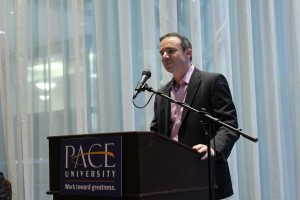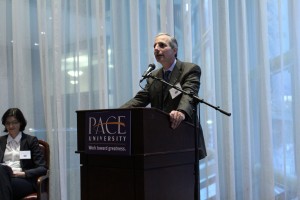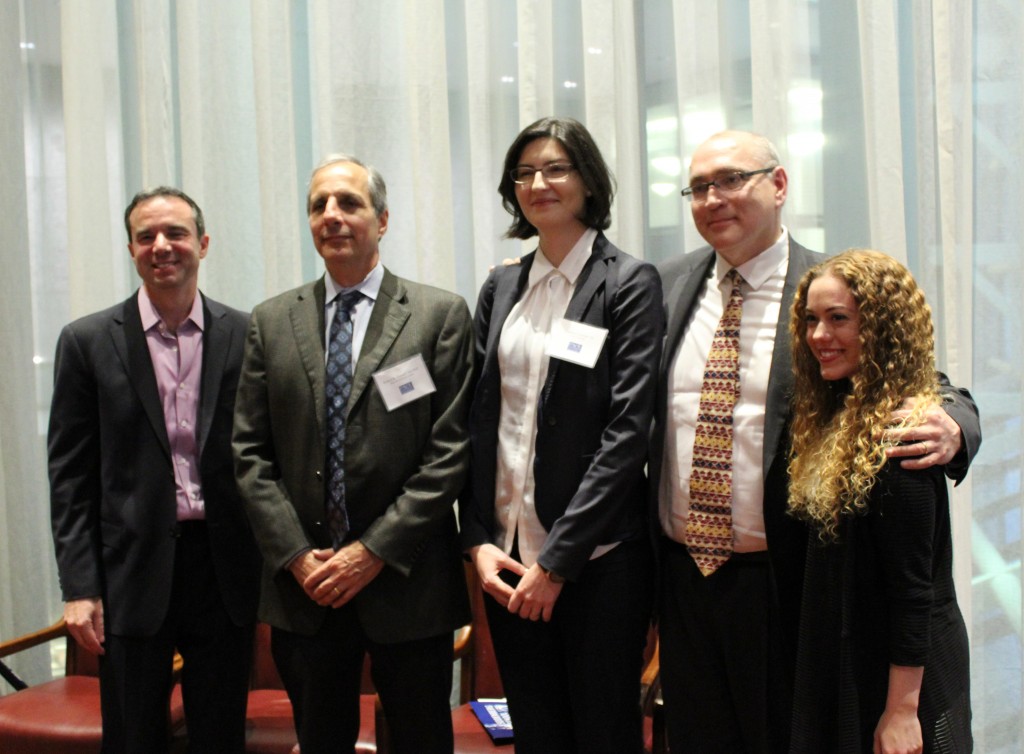The second of our LST Honoree Speaker Series took place on our Westchester campus. Butcher Suite was looking mighty full as a crowd of Pace students, staff, faculty, and our alumni and friends at IBM stopped by to listen to our spotlight day’s speaker, Nick Donofrio.
Similar to the previous LST Honoree speaker event with Judy Spitz, the format was interview style, with Seidenberg student Christian Nahshal (BS in Information Technology ’17) taking the stage alongside our guest. What followed was a fascinating conversation, where our 2013 LST Honoree, Nicholas Donofrio, shared his incredible insights, experiences, and wisdom.
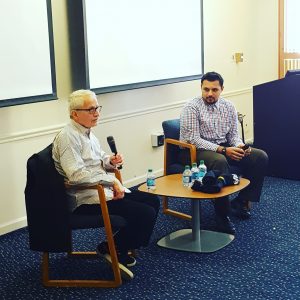 Nick Donofrio led IBM’s technology and innovation strategies from 1997 until his retirement in October 2008. He spent the early part of his career in integrated circuit and chip development as a designer of logic and memory chips. In the years that followed, he advanced and succeeded in numerous technical management positions and, later, executive positions in several of IBM’s product divisions. Notably, he was vice chairman of the IBM International Foundation and chairman of the Board of Governors for the IBM Academy of Technology.
Nick Donofrio led IBM’s technology and innovation strategies from 1997 until his retirement in October 2008. He spent the early part of his career in integrated circuit and chip development as a designer of logic and memory chips. In the years that followed, he advanced and succeeded in numerous technical management positions and, later, executive positions in several of IBM’s product divisions. Notably, he was vice chairman of the IBM International Foundation and chairman of the Board of Governors for the IBM Academy of Technology.
One of the first things Nick spoke about was what he gained from doing co-op assignments with IBM while he was at college. “I can’t say enough about co-op assignments, this idea of work study,” he said. One of the best things about doing relevant work while studying is that it helps cement theoretical learning with practical training.
As an engineer, it was useful to Nick to combine the two as it helped him learn to find solutions for specific problems. “You need to be more problem-based in the way you learn and the way you think, because that’s what engineers are.”
Nick also spoke about how important it was to get and maintain technical skills. Even though the higher up the ladder you go the fewer technical skills you typically use, it’s important to try to stay technical as long as you can.
He also introduced the concepts T-shaped and I-shaped personalities, and the importance of practicing the behaviors and traits of a T-shaped person. An I-shaped person is one that is an expert in one area and does not (and therefore cannot) solve problems outside of their field. However, if one takes the time to advance their knowledge in related areas, they spread their field of expertise – become T-shaped – and can apply a broader range of knowledge to solve different problems.
Expanding your area of knowledge also means you can connect two disparate ideas and create new things. “When you intersect things that don’t normally, or never have been intersected, you become an innovator,” said Nick. “It also allows you to explore the gaps,” finding new ideas within existing areas of knowledge.
“How do you bring that into a leadership aspect?” asked Christian, bringing the conversation around to Nick’s experiences in executive positions.
“Focus on how value is created, where, and how it is created,” Nick said. A good leader should see the strengths and weaknesses of their staff and assign them tasks and roles that allow them to work to their greatest strengths, individually and within the team.
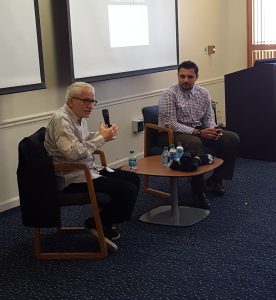 He also spoke about how important it is to be honest. “Transparency, openness, collaboration,” Nick said. If something goes wrong, it is always better to be upfront about it so a solution can be figured out sooner. “We’re going to find out the truth in the end anyway. Because that’s how it works. You may as well tell me now that you screwed up, that the project is 6 months late, that you’re not going to deliver, you might as well tell me NOW so I can help you.”
He also spoke about how important it is to be honest. “Transparency, openness, collaboration,” Nick said. If something goes wrong, it is always better to be upfront about it so a solution can be figured out sooner. “We’re going to find out the truth in the end anyway. Because that’s how it works. You may as well tell me now that you screwed up, that the project is 6 months late, that you’re not going to deliver, you might as well tell me NOW so I can help you.”
He shared a saying he likes to use: “You be forthright, I will be forthcoming. Tell me the truth; I will get you the resources.”
Christian then asked about what Nick considers to be one of the most important successes of his life.
“The impact I have had on the lives of people and the impact they’ve had on me,” Nick replied, explaining that the opportunities he has had to help other people have had a powerful effect on him, particularly the ability to lend an empathetic ear or be a sounding board. “To know the answer, but to know to listen is a very important gift.”
Nick is also a big advocate of paying it forward: “I want you to remember what I did for you and do something for somebody else. Too often, sadly, that does not happen. People get where they want to be, and the first thing they do is to lock the door. Don’t be that person.”
Several members of the audience then got to ask questions, which Nick happily answered, including a question about his experiences working with Steve Jobs. He described the kind of innovative thinking that enabled Steve Jobs to get to where he did: “Steve Jobs would solve your problems a different way. That’s what innovators do. He understand workflow better than anyone – that was what his gift was – and he would start with the problem. Any time he started with the answer he was wrong. He didn’t really create anything, he just studied it from the end user perspective.”
Another student asked “What qualities do you have that make you a T-shaped person?”
“You have to know your limits and your abilities, but that doesn’t mean you stop asking the questions,” Nick responded, and went on to recommend reading up on the Medici family who were around in Renaissance Florence. They were a very rich and powerful family who brought around the beginning of the industrial revolution. “They were T-shaped,” Nick said. “They thought about combining this craft with that craft,” which exemplifies the king of T-shaped thinking described above.
Bringing his point a little closer to the present day, Nick spoke about his time as a manager at IBM. “I didn’t know how to do a lot of things at IBM, but I would teach people how to teach themselves. T-shaped people are enablers, open, collaborative, multi-disciplined, global thinkers. They enable others to be better.”
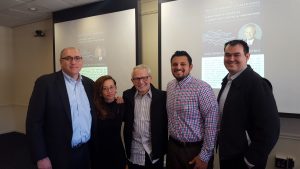
There was a final question – what was Nick’s favorite project?
“Probably the most embarrassing and the most rewarding,” Nick said. “When I became a manager back in the early 70s. I managed a group as the lead circuit designer. We were all friends. After a year, we had an opinion survey. For every group in IBM, you had the best and the worst. The best got rewarded by the chairman and the worst… we never heard from them again!”
When the survey results rolled around, Nick was dismayed to learn that he’d received a 1.2 out of 5 – from a team of people he considered his close friends. However, the more time he spent ruminating on his management style, the more he realized that perhaps he hadn’t been the best manager he could be. In fact, as his background had been doing the same job as the rest of the team, he realized that he’d spent the last year continuing to do that job, a job that wasn’t his any more.
“Now IBM wants me to go into a meeting with them and ‘find out why they think you’re a jerk, but you can’t outright ask them as the survey is anonymous’. I went into the meeting and told them, I am so sorry, I obviously let you all down. I know I must have been a jerk the last year, it’s clear to me that I was trying to do your job instead of my job. It’s clear to me that I may be fired. It’s also clear to me that if you’ll have me, I will change. I will be more collaborative, more open, the manager you want me to be. I will be a manager, not a circuit designer. To a person, they all agreed to keep me on.”
As luck would have it for Nick, there was one other person in the entire company with a score of 1.0, so Nick got to keep his job (it was decidedly unlucky for the other guy, though!)
“So my advice is that if you’re going to be bad, be bad early in your career!”
Following the Q&A, Nick stayed behind to chat with students and meet the community. We would like to thank Nick for spending an incredible couple of hours with us and for sharing the amazing stories and lessons he has learned over the years.
We hope to have you back soon! As Dr. Jonathan Hill, Dean of Seidenberg School remarked, “There is a reason why this gentleman fills a room.”
The final event in our LST Honoree Speaker Series will be held on April 19th, with guest speaker Austin A. Adams. RSVP here!


